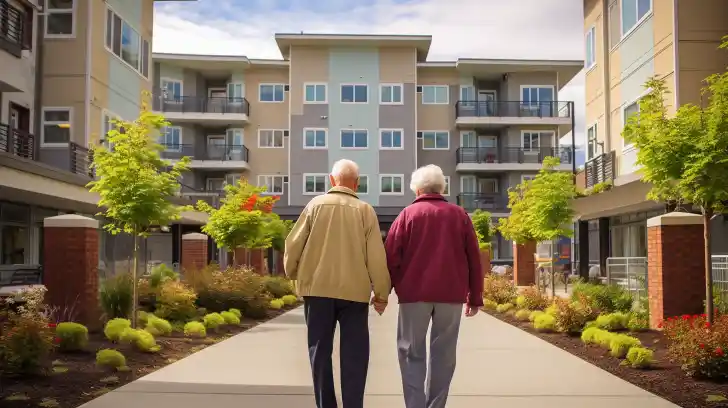Finding the right senior housing on a fixed income can feel like searching for a needle in a haystack. You’re balancing the need for comfort and accessibility with the reality of pensions, Social Security, and savings that don’t stretch as far as they used to.
It’s no secret that inflation has been chipping away at purchasing power, making it even tougher for seniors to find affordable living options.
Here’s an important fact: you’re not alone in this quest. Affordable housing does exist for those who have reached their golden years on fixed incomes. This article will guide you through understanding costs, exploring beneficial programs, and planning ahead no matter your current age or financial situation.
We’ll unlock doors to affordable solutions that prioritize safety, community, and quality of life without breaking the bank. Ready to simplify your senior housing hunt? Let’s dive in!
Key Takeaways
- You can find affordable senior housing, like low – income apartments and HUD programs, that fit into a tight budget.
- Programs like Social Security, SSI, Medicaid waivers, and Section 8 vouchers help pay for some living costs.
- Planning early for retirement in your 40s or 50s makes it easier to save enough money for later life.
- Even in your 70s and beyond, you still have choices to make your living costs manageable.
- Look at all the different kinds of places where seniors can live cheaply – from adult family homes to sharing a house with friends.
Understanding the Concerns of Senior Housing on a Fixed Income

Living on a fixed income makes finding the right senior housing important but tough. Money each month is limited. Social Security, pensions, and any savings are what you have to work with.
Costs for a place to live take up a big part of your budget. The worry is real: paying too much for rent could mean less money for food or medicine.
Many seniors face this problem as prices go up but their income doesn’t change much. You want to feel safe and happy in your home without spending all your money on it. It’s key to look into affordable options that let you enjoy life without stress over bills.
That means homes with lower costs that still meet your needs, like being close to doctors or having help nearby if you need it.
Estimating the Amount of Money Required for Senior Living

Figuring out how much money you need for senior living is a big step. You might see numbers like $1,500 to $4,000 per month for a place of your own. But the truth is, it all depends on where you want to live and what kind of help you need.
Some places cost more because they offer extra services like meals or help with day-to-day tasks.
If you’re looking at assisted living, remember that costs go up for care and support services. This means if you need more help with health stuff or getting around, it’s going to be pricier than just rent.
It’s smart to think about all these things now so there are no surprises later.
Check out tools like retirement community calculators too. They can give you a better picture of what long-term housing expenses will look like. Plus, guides by groups like the Government Accountability Office share best practices so you can trust their advice on planning your budget right from the start!
Core Benefits that Could Help Cover Senior Living Costs
You might be able to use social security benefits and other government programs to help pay for a place to live as you get older. Social Security offers monthly money that many seniors count on.
This can go toward housing costs at places made just for older people. If your income is really low, Supplemental Security Income (SSI) could also give extra cash each month.
Another way to help cover living costs is through long-term care insurance. This type of plan pays for the care you need if you get very sick or can’t do everyday things by yourself anymore.
Also, programs like Medicaid might chip in for certain types of senior housing, such as nursing homes or assisted living spots, especially if your savings are limited. Always check what these programs offer because they could really make a difference in managing your bills every month.
Planning Ahead: Budgeting for Senior Living
When facing the golden years on a fixed income, crafting a financial plan for senior living is not just prudent—it’s essential. You’ll need to assess your current resources and project future expenses, ensuring that your budget aligns with the costs of comfortable and secure housing options tailored to your needs.
Planning in Your 40s
In your 40s, thinking about senior living might seem early, but it’s a smart move. Start by looking at your income and what you own. See how much money you have in retirement accounts like 401(k)s or IRAs.
It’s good to add up these numbers because they will show if you’re on track for having enough cash when you retire.
You should also think about making a budget now for when you are older. This budget can help guide how much money you need to save each year before retiring. Then, start putting away more into savings and investments like mutual funds or annuities that can grow over time.
Planning early means less worry later on!
Planning in Your 50s
Your 50s are a key time to ramp up retirement savings and cut down on bad debt. Think about saving as much as you can now so you won’t have to worry later. You need a clear plan for the lifestyle you want after you stop working.
Take a close look at your costs, especially big ones like where you’ll live. Make sure to know how much money will come in every month from places like Social Security or any pensions.
Check off items on a retirement planning list that works best for someone in their 50s. This way, you can save plenty and pay off debts, setting yourself up for stable finances when it’s time to retire.
Focus on what your golden years will look like and make plans that match those goals. A good budget is crucial for managing your cash once there’s no paycheck coming in each week. Now is also smart to think about health insurance and other future needs so nothing catches you by surprise later on.
Planning in Your 60s
In your 60s, time is critical for making smart choices about where you will live and how much it will cost. Start by looking closely at what you need to pay for a comfortable life.
Think about medical bills and housing payments. These are big parts of your budget.
You might want to talk to a financial advisor who puts your needs first. They can help you make good money choices. Creating a plan before retiring is wise—it makes sure you have enough cash to live well and take care of yourself.
Look into different ways to save like senior discounts or programs that help with costs like health insurance or home energy bills. Getting these details lined up can lead to peaceful golden years without money worries.
Planning in Your 70s+
You might think it’s too late to start planning for your golden years once you’re in your 70s or older, but that’s not true. You still have options to make sure you can afford a comfortable place to live.
Take stock of all your income, from social security benefits to any retirement accounts and assets. Look at how much money comes in each month and where it goes.
Also, consider what benefits could help cover costs like HUD housing programs or other public assistance available for senior citizens. Talk with local public housing agencies about what low-income senior housing choices are out there for you.
Think about downsizing if you’re living in a big house—selling could give you more cash for finding the right home that fits your budget and needs now.
Remember, even though time is shorter, making smart moves today will still help improve how well you live tomorrow.
What is Affordable Senior Housing?
Affordable senior housing is special living places for older people with less money. This type of housing helps them pay less rent and still have a good, safe home. It’s made for seniors who get limited money each month or year.
Many times, these homes cost less because the government gives some help to the owner or landlord.
In affordable senior homes, you often find that there are rules about how old you must be to live there. They check your age and your income to see if you can move in. These places give older adults a chance at staying independent without spending too much on where they live.
Plus, living among others their age can make life more fun and less lonely.
Exploring Affordable Senior Housing Options
7. Exploring Affordable Senior Housing Options:.
Discovering affordable senior housing isn’t just a dream—it’s an attainable goal with the right knowledge and resources. Let’s delve into the variety of options that align with your budget, from government programs to alternative living arrangements, ensuring comfort and financial security in your golden years.
Low-Income Senior Apartments and Condos
You might want to check out low-income senior apartments and condos. They are a good choice if you need a place that fits your budget. These homes are often built with you in mind, offering features that make life easier as you get older.
Many have ramps, grab bars in the bathrooms, and easy-to-reach cabinets.
Living in these apartments or condos can also connect you with neighbors who are the same age. This can help beat loneliness and keep your social life active. You may find common areas where people gather to chat or share meals.
The government gives help so seniors paying for housing isn’t so tough on their wallets. Programs like Section 8 housing vouchers can lower how much rent you pay each month. Be sure to look into what programs you might fit into to save money on a great new home.
Cooperative Housing for Seniors
Cooperative housing for seniors is a smart choice if you’re over 55 and want to keep your freedom while enjoying some company. You own part of the building together with other residents, which can make it easier to handle day-to-day tasks and home maintenance.
Living in a co-op means you get your own space but also share in making decisions about the place.
These homes are designed just for older adults like yourself, providing safety and a chance to be social without giving up your independence. Plus, being part of a community where everyone looks out for each other can help beat feelings of loneliness.
In senior cooperative housing, you’ll find friends who care and support nearby.
HUD Housing Programs
HUD Housing Programs offer a special chance for you to find a safe and affordable place to live. The government helps low-income seniors by giving free money called capital advances to groups that build homes just for older people.
These homes come with lower rents and support like help with meals, getting around, and taking care of the house.
You also have choices through Section 8 housing choice vouchers. This program lets you pick your own place in any public housing complex or other types of low-cost housing. You pay some rent based on what you earn, and the program takes care of the rest.
Living here means you’re close to neighbors who are also seniors, which can make life more fun and less lonely. HUD makes sure these homes are nice places to live where you can feel happy and secure.
Virtual Retirement Communities
Virtual retirement communities are a fresh way for you to live well on a fixed income. These online networks help connect seniors with services and support they might need. You can find these groups through the Village to Village Network, which has information about places near you.
They make sure older adults can get around and do day-to-day tasks.
In these communities, you don’t have to worry about being alone. They offer friendship and help, from getting rides to setting up home repairs. This means you can save money while still taking good care of yourself.
Living in one of these places often costs less than other senior homes.
You also get ways to stay active without spending much money. Virtual retirement communities focus on your needs as you grow older, giving both affordable housing choices and chances to meet other people.
Adult Family Homes or Adult Foster Care
Adult family homes or adult foster care are cozy places for you to live if you don’t need a big building like a nursing home. Think of them as regular houses in the neighborhood where only a few seniors live together.
You’ll have people there to help with things like cooking, cleaning, and making sure you take your medicine.
These homes give personal care and make sure each person gets what they need. If you want to feel like part of a small family, this might be good for you. Here, it’s easier to make friends because there aren’t too many people around.
Another plus is that these homes often cost less than bigger senior living places. They work well for folks who can’t afford much but still want some help every day. The staff usually knows everyone by name and treats everyone special, which can make life happier as you grow older.
Moving in With Family
Living with family can be a smart way to save money. If you are an older person and have less cash coming in, staying with relatives might make things easier. You won’t have to pay as much for a place to live, which helps when you’re on a fixed income.
Sharing meals and other costs with your loved ones also means spending less overall.
Some families find that this choice brings them closer together. You can help each other out day by day. Also, being around family may mean you don’t feel as alone. But it’s important to talk about your needs and what everyone expects before making the move.
This will help keep things running smoothly for both you and your family members.
Finding a Roommate
Many seniors are now sharing homes to save money. Online platforms help them find people their age to live with. These roommate-finding tools are good for older Americans who need a cheaper place to stay.
Sharing a house can cut costs on many things like bills and rent.
Living with someone also helps fight loneliness. It’s nice to have company, especially as you get older. Seniors can feel safer and share chores when they have a housemate. Plus, it’s great for making new friends in your golden years!
Navigating Payment Options for Senior Housing
Understanding your payment options for senior housing is crucial, as it opens doors to comfortable living within your financial reach; delve deeper to uncover the possibilities that align with your budget.
Will Medicaid or Medicare Pay for Low-Income Senior Housing?
Medicare won’t help you pay for low-income senior housing. This program mainly covers your doctor visits, hospital stays, and medicine. It won’t cover the costs where you live or regular meals.
Medicaid might be different. It usually doesn’t pay for room and board in places like assisted living facilities either. However, if you qualify, Medicaid might help pay for other services while you’re there to make life easier, such as nursing care and help with daily activities.
But it’s important to check what’s covered in your state because every state has different rules.
Some states have Medicaid waivers that give extra benefits if you meet certain conditions. These can support seniors who want to stay at home or need only a bit of extra care that isn’t too costly.
Always talk to a professional who knows about Medicaid in your area so they can tell you exactly what financial assistance you could get and how to apply for it.
Budgeting Tips for Seniors on a Fixed Income
Living on a fixed income can be tough. You need smart money moves to keep your finances in check.
- Look at your big bills first, like where you live, health insurance, and car payments. See where you might spend less.
- Keep track of what you buy each month. This helps find places to save money.
- Use a budget calendar every month. It shows when money comes in and goes out, making it easier to manage.
- Spend wisely on must – haves like food and medicine. Plan before buying anything.
- Boost your cash by finding extra ways to make money after retirement.
- Learn about programs that help save dollars. Things like cheaper meal services or help with home energy bills are out there for seniors.
- Get smart with how you handle debts and bills. Good planning keeps stress away.
Comparing Senior Living Costs
Comparing the costs of senior living options requires a clear and systematic approach. With the wide variation in expenses from state to state and the range of services offered, it’s essential to have a comprehensive overview to make an informed decision that aligns with your fixed income.
| Type of Senior Housing | Cost Range | Average Cost | Factors Affecting Cost |
|---|---|---|---|
| Assisted Living | $2,881 – $11,288/month | Varies by location and services | Level of care needed, location, room type |
| Memory Support Communities | Variable | Dependent on care level | Specialized care requirements, staff-to-resident ratio |
| Independent Living | $1,500 – $4,000/month | Median of $2,522/month | Amenities offered, housing quality, location |
| Retirement Community | Inclusive of housing, utilities, food, etc. | Median fee of $2,522/month | Extent of included services, community location |
Armed with this data, seniors on a fixed income can weigh their options more precisely. Focus on the specifics of each potential living arrangement and the associated costs to arrive at a decision that ensures comfort without straining finances.
Qualifying for Low Income Senior Housing
Discovering a comfortable and secure home on a tight budget can seem daunting, but qualifying for low income senior housing is less complex than you might think. You’ll need to navigate the eligibility requirements and application process, which are designed to ensure that those most in need receive assistance suitable for their financial situation.
HUD’s Section 202 Supportive Housing for the Elderly Program
The HUD’s Section 202 Supportive Housing for the Elderly program is a special way to make living places more affordable for you if you’re older and don’t have much money. This program cuts down how much rent you pay, making it easier to live on your own without spending all your cash.
Plus, it comes with extra services that can help with things like cooking and cleaning.
To get into this housing, you need to be at least 62 years old and not have a lot of money—your income should be less than half of what most people make where you live. The good news is that lots of seniors who use this program stay put because it works well for them.
It means having a safe place to call home without breaking the bank.
Living here could help keep you healthy by giving support when needed while also letting you save money. If friends or family can’t help as much, or if other housing options are too pricey, think about HUD’s Section 202 homes.
They’re built just for elderly folks like you who want to enjoy life without stressing over bills too much.
HUD’s Section 8 Housing Choice Voucher Program
HUD’s Section 8 Housing Choice Voucher Program helps you find a safe and affordable place to live. If your income is very low, you might qualify for this help. This program lets you choose a home or apartment that fits your needs.
Landlords have to make sure these places are good enough to live in.
You must meet certain rules based on how much money you earn each year. They also look at if someone is old, has a disability, or has a family. Don’t worry if it seems hard to qualify because there are people who can help guide you through the process.
This program gives special support to older adults like yourself who don’t get much money every month and need an affordable housing choice.
Low Income Housing Tax Credit Program
The Low Income Housing Tax Credit Program (LIHTC) is a big help for seniors like you looking to find an affordable place to live. Builders and owners of apartment buildings get tax breaks from the government when they make homes that cost less for people with not so much money.
These homes have rents that don’t take too much of your income, which is great when you’re trying to keep your costs down.
With LIHTC, developers are encouraged to create new apartments or fix up old ones for folks who need budget-friendly housing options. This program has rules about how much money you can make to get into one of these affordable units.
It’s a huge part of making sure there are enough places where older people on fixed incomes can live without spending all their cash on rent.
What to Look for in Affordable Senior Housing Communities
You want your new home to be safe and comfortable. Look for places with good lighting, handrails, and easy access inside and out. Check if they have help buttons in rooms in case of emergencies.
Make sure the community feels friendly where you can make friends and not feel alone.
Affordable housing should fit your budget but also meet your needs. Find out if they offer meals or help with taking medicine. Ask about activities that keep you moving and happy. Some places may even help you get to doctors’ appointments or go shopping.
Energy bills can add up, so ask if the building saves energy which will save money too. See if there’s a spot for you to plant flowers or vegetables if you like gardening. Don’t forget to look at what stores, parks, or churches are nearby using public transportation or walking.
Conclusion
Finding the right home for seniors on fixed incomes can be tough. But with some looking around, you can find places that fit your wallet and needs. Remember to use programs and benefits you might have access to.
Talk to others who’ve been where you are – they could have tips. Your golden years should be comfortable, and a good home is a big part of that.
FAQs
1. What kinds of housing are available for someone on a fixed income?
There are many types of homes for people with a fixed income, like low-income housing, public housing complexes, affordable housing units, and co-ops which help elderly people save money.
2. Can seniors get help paying for food or energy bills?
Yes! Seniors can join programs like Meals on Wheels or the Low-Income Home Energy Assistance Program (LIHEAP) that help pay for meals and make their houses use less energy to save money.
3. How can retirees find extra money to live better?
Retirees might look at things like reverse mortgages, annuities from insurance companies, certificates of deposit from banks, corporate bonds from companies or real estate investment trusts (REITs) to earn more money.
4. Are there any loans that seniors should avoid?
Elderly folks should be careful with payday loans and cash advances because they have high interest rates which can cost a lot over time.
5. How do senior citizens pay less for healthcare costs?
Seniors could use social security benefits or look into Medicare and Medicaid options; they also might check out supplemental plans to cover co-pays and medical conditions without spending too much.
6. Can living with others help cut down costs in senior years?
Sure! Finding housemates or joining an extended-family setting can lower living expenses by sharing the cost of rent, food and maybe even splitting caregiving duties to reduce those bills too.
Source Links
- https://richfieldliving.com/how-to-make-the-most-of-senior-living-on-a-fixed-income/
- https://ncoa.org/article/what-does-living-on-a-fixed-income-mean
- https://www.seniorliving.org/care/cost/affordable/
- https://www.huduser.gov/portal/periodicals/em/summer17/highlight1.html
- https://www.hud.gov/topics/information_for_senior_citizens
- https://www.seniorliving.org/apartments/






